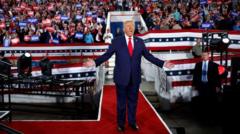As world leaders prepare for COP29, the return of Donald Trump to the presidency is viewed as a significant impediment to climate initiatives. Climate experts warn that the US president-elect's skepticism towards climate action, along with his previous withdrawal from the Paris Agreement, may hinder global efforts to combat climate change.
Trump’s Return to Power Poses Setback for Climate Action

Trump’s Return to Power Poses Setback for Climate Action
Experts express concern that Trump's election could hinder immediate climate progress, but future impacts remain uncertain.
President-elect Donald Trump's anticipated policies toward climate action are stirring significant apprehension among environmental experts. His recent election victory is seen as a potential roadblock to immediate climate initiatives, especially as leaders gear up for the COP29 summit.
Climate change, largely absent from campaign discussions, is now propelled into the spotlight as Trump’s previous stance and proposed actions come into sharper focus. During his first term, Trump withdrew the US from the Paris Agreement, a pivotal treaty designed to unite nations in reducing greenhouse gas emissions. With potential withdrawal from this agreement again looming, the concern is that the US could undermine international commitments to fight climate change.
Trump's previously expressed views, branding green energy initiatives as a "scam," have left many questioning his forthcoming policies on renewable energy. However, the growing popularity and financial viability of solar and wind energy in the US could pose challenges to the effective implementation of his vision aimed at increasing oil and gas exploration.
Experts like Prof. Richard Klein from the Stockholm Environment Institute caution that as an incoming administration, Trump’s governance could prevent the US from making meaningful commitments at COP29. This unwillingness to engage in binding agreements may cause other countries, particularly China, to take a step back in their commitments as well.
While there have been calls for developing nations to contribute to climate funding—a demand supported by the US—the current political climate could shift funding responsibilities significantly. There is palpable concern that previous efforts to mobilize financial resources for climate initiatives in developing countries may face severe setbacks, as Trump's administration opts for isolationism and prioritizes US domestic energy interests.
In a broader context, Trump's victorious return poses questions about the future of international climate accords beyond the Paris Agreement. Legal ambiguity surrounds any potential withdrawal from existing climate treaties, which, if pursued, would signify a rejection of multilateralism.
As the Trump administration is expected to promote fossil fuel exploration aggressively, analysts are split on the long-term consequences for the burgeoning renewable energy sector. Some believe that while traditional energy sources may receive a boost, the ongoing investment in green technology could remain resilient, bolstered by infrastructure legislations like the Inflation Reduction Act.
Notably, a significant portion of funding associated with this act has benefited Republican-led districts, suggesting a complex political landscape surrounding energy investments. Nonetheless, figures like former UN climate chief Christiana Figueres assert that while the ramifications of Trump's presidency could be a tangible setback for climate action globally, it will not extinguish the momentum toward economic decarbonization and sustainability.
Ultimately, the focus now shifts to global leaders’ adaptability and resilience in steering the climate agenda forward, even in the face of Trump's recent electoral victory.
Climate change, largely absent from campaign discussions, is now propelled into the spotlight as Trump’s previous stance and proposed actions come into sharper focus. During his first term, Trump withdrew the US from the Paris Agreement, a pivotal treaty designed to unite nations in reducing greenhouse gas emissions. With potential withdrawal from this agreement again looming, the concern is that the US could undermine international commitments to fight climate change.
Trump's previously expressed views, branding green energy initiatives as a "scam," have left many questioning his forthcoming policies on renewable energy. However, the growing popularity and financial viability of solar and wind energy in the US could pose challenges to the effective implementation of his vision aimed at increasing oil and gas exploration.
Experts like Prof. Richard Klein from the Stockholm Environment Institute caution that as an incoming administration, Trump’s governance could prevent the US from making meaningful commitments at COP29. This unwillingness to engage in binding agreements may cause other countries, particularly China, to take a step back in their commitments as well.
While there have been calls for developing nations to contribute to climate funding—a demand supported by the US—the current political climate could shift funding responsibilities significantly. There is palpable concern that previous efforts to mobilize financial resources for climate initiatives in developing countries may face severe setbacks, as Trump's administration opts for isolationism and prioritizes US domestic energy interests.
In a broader context, Trump's victorious return poses questions about the future of international climate accords beyond the Paris Agreement. Legal ambiguity surrounds any potential withdrawal from existing climate treaties, which, if pursued, would signify a rejection of multilateralism.
As the Trump administration is expected to promote fossil fuel exploration aggressively, analysts are split on the long-term consequences for the burgeoning renewable energy sector. Some believe that while traditional energy sources may receive a boost, the ongoing investment in green technology could remain resilient, bolstered by infrastructure legislations like the Inflation Reduction Act.
Notably, a significant portion of funding associated with this act has benefited Republican-led districts, suggesting a complex political landscape surrounding energy investments. Nonetheless, figures like former UN climate chief Christiana Figueres assert that while the ramifications of Trump's presidency could be a tangible setback for climate action globally, it will not extinguish the momentum toward economic decarbonization and sustainability.
Ultimately, the focus now shifts to global leaders’ adaptability and resilience in steering the climate agenda forward, even in the face of Trump's recent electoral victory.



















